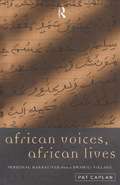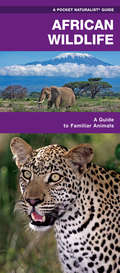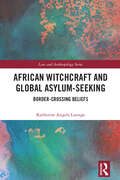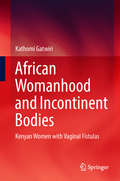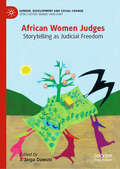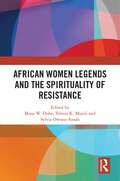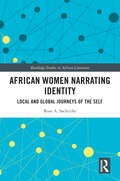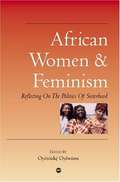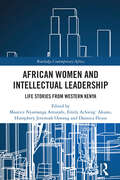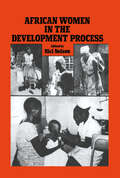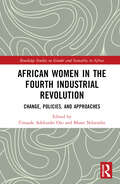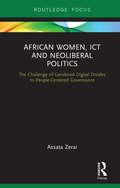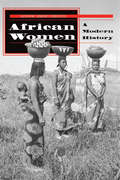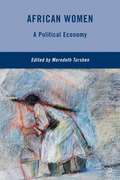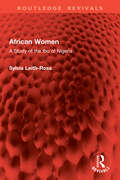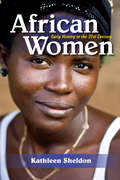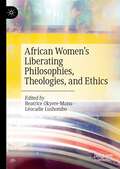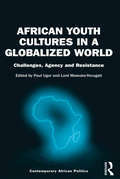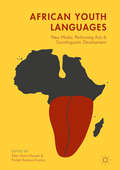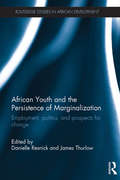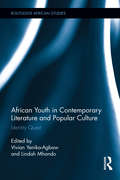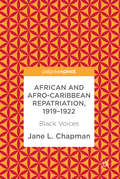- Table View
- List View
African Voices on Slavery and the Slave Trade
by Alice Bellagamba Sandra E. Greene Martin A. Klein Alice Bellagamba Sandra E. GreeneThough the history of slavery is a central topic for African, Atlantic world and world history, most of the sources presenting research in this area are European in origin. To cast light on African perspectives, and on the point of view of enslaved men and women, this group of top Africanist scholars has examined both conventional historical sources (such as European travel accounts, colonial documents, court cases, and missionary records) and less-explored sources of information (such as folklore, oral traditions, songs and proverbs, life histories collected by missionaries and colonial officials, correspondence in Arabic, and consular and admiralty interviews with runaway slaves). Each source has a short introduction highlighting its significance and orienting the reader. This first of two volumes provides students and scholars with a trove of African sources for studying African slavery and slave trade.
African Voices on Slavery and the Slave Trade
by Martin A. Klein Alice Bellagamba Sandra E. Greene Bellagamba, Alice and Greene, Sandra E. and Klein, Martin A.Though the history of slavery is a central topic for African, Atlantic world and world history, most of the sources presenting research in this area are European in origin. To cast light on African perspectives, and on the point of view of enslaved men and women, this group of top Africanist scholars has examined both conventional historical sources (such as European travel accounts, colonial documents, court cases, and missionary records) and less-explored sources of information (such as folklore, oral traditions, songs and proverbs, life histories collected by missionaries and colonial officials, correspondence in Arabic, and consular and admiralty interviews with runaway slaves). Each source has a short introduction highlighting its significance and orienting the reader. This first of two volumes provides students and scholars with a trove of African sources for studying African slavery and slave trade.
African Voices, African Lives: Personal Narratives from a Swahili Village
by Pat CaplanAfrican Voices, African Lives explores the world of 'Mohammed', a swahili peasant living on Mafia Island, Tanzania. Through his own words - some written, some spoken - and those of his relatives, including his ex-wife and one of his daughters, he enables us to see the world through his eyes, including the invisisble world of spirits which plays a significant role in his life. This information is gathered by Pat Caplan, the anthropologist, over almost three decades of talking and writing to each other. She acts not only as translator and editor, but also as interpreter, bringing in her own knowledge gathered from field data as well as comparative material from other anthropological work. By utilising a mixture of styles - narrative and life history, ethnographic observation, and the diary kept by Mohammed at the anthropologist's bequest, African Voices African Lives will make an important contribution to current debates in anthropology by grappling with issues raised by 'personal narratives', authorial authority, and with refexivity.
African Wildlife
by James Kavanagh Raymond LeungEco-tourists, adventurers, and nature lovers will find African Wildlife to be the ideal guide to refer to on safari. The familiar elephant is one of thousands of species of animals inhabiting the diverse ecosystems found throughout region. This beautifully illustrated guide highlights over 140 familiar and unique species of mammals, birds, reptiles, amphibians and includes a map of the country's vegetation zones. This guide is an excellent source of portable information and ideal for field on safari.
African Witchcraft and Global Asylum-Seeking: Border-Crossing Beliefs (Law and Anthropology)
by Katherine LuongoThis book analyzes how over the last two decades, immigration regimes in three primary refugee-receiving states in the Global North – Canada, Australia, and the United Kingdom – have engaged with allegations about witchcraft-driven violence made by asylum seekers coming from Anglophone countries across the African continent. The work intervenes at the nexus of anthropological, historical, legal, developmental, and human rights literatures to offer fresh insights into extrajudicial violence and global migration. Taking witchcraft-based asylum cases as its focal point, it argues that the recent dramatic expansion in claims to refugee protection under the ‘particular social group’ category of the 1951 UN Refugee Convention reflects immigration authorities’ increasing willingness to consider how legally recognizable persecution can derive from cultural practices and beliefs. Reflecting critically on such cases, it advances understandings of how witchcraft beliefs and practices have persisted as significant engines of violence in the contemporary world. It sheds light both on the limits of legal pluralism and cultural relativism in asylum adjudication and on how social scientific expertise contributes not simply to the flow of ideas, but also to the channelling of people across national, cultural, and epistemological boundaries. The book will be essential reading for students and researchers in legal anthropology, African studies, human rights, transnational history, migration and refugee law and policy, and the history and anthropology of witchcraft.
African Womanhood and Incontinent Bodies: Kenyan Women with Vaginal Fistulas
by Kathomi GatwiriThis book reveals the structures of poverty, power, patriarchy and imperialistic health policies that underpin what the World Health Organization calls the “hidden disease” of vaginal fistulas in Africa. By employing critical feminist and post-colonial perspectives, it shows how “leaking black female bodies” are constructed, ranked, stratified and marginalised in global maternal health care, and explains why women in Africa are at risk of developing vaginal fistulas and then having adequate treatment delayed or denied. Drawing on face-to-face, in-depth interviews with 30 Kenyan women, it paints a rare social portrait of the heartbreaking challenges for Kenyan women living with this most profound gender-related health issue – an experience of shame, taboo and abjection with severe implications for women’s wellbeing, health and sexuality. In absolutely groundbreaking depth, this book shows why research on vaginal fistulas must incorporate feminist understandings of bodily experience to inform future practices and knowledge.
African Women Judges: Storytelling as Judicial Freedom (Gender, Development and Social Change)
by J. Jarpa DawuniThis edited volume centers the voices of African women judges as agents of justice and equality. The legal and personal narratives approach in the book privileges the contributors’ lived experiences, professional trajectories, contributions and challenges. The legal narrative storytelling approach also contributes to oral histories of African indigenous knowledge production and transfer. By highlighting the substantive representation of women in African judicial leadership, the chapters examine their impact on the development of jurisprudence, judicial administration, and contributions to the rule of law, access to justice, and women's rights in contemporary Africa. This book significantly contributes to the diversity of knowledge and representation in the global discourse on gender and judging, offering a novel contribution to the growing literature on African women judges.
African Women Legends and the Spirituality of Resistance
by Musa W. Dube Telesia K. Musili Sylvia Owusu-AnsahThis volume focuses on African indigenous women legends and their potential to serve as midwives for gender empowerment and for contributing towards African feminist theories. It considers the intersection of gender and spirituality in subverting patriarchy, colonialism, anthropocentricism, and capitalism as well as elevating African women to the social space of speaking as empowered subjects with public influence. The chapters examine historical, cultural, and religious African women legends who became champions of liberation and their approach to social justice. The authors suggest that their stories of resistance hold great potential for building justice-loving Earth Communities. This book will be of interest to scholars of religion, gender studies, indigenous studies, African studies, African-indigenous knowledges, postcolonial studies, among others.
African Women Narrating Identity: Local and Global Journeys of the Self (Routledge Studies in African Literature)
by Rose A. SackeyfioThis book examines the complexities of women’s lives in Africa and the transnational spaces of Europe and North America through the literary works of key African women writers. Using a postcolonial analytical framework, the book highlights the commonalities of African women’s identities and experiences across national, ethnic, linguistic, and religious boundaries in Africa and in western settings. It collates the multi-regional narratives of key African women writers who convey how women’s lives are shaped by social, economic, and political factors at home and abroad. It also illustrates the intersection of ethnicity, class, and gender that flows through all the texts examined. Unlike existing works that explore African women’s fiction, this book uncovers the transformation from postcolonial themes of nationhood to global modalities of post-independence writing through the lens of gender. The book engages with feminist expression through broad themes including religion, war and ethnic conflict, women’s status in society, tradition and modernity and local and global tensions. A unique approach to literary criticism of Anglophone African women’s writing, this book will be of interest to scholars and students in the field of African Literature, African Studies, Women’s Literature, Postcolonial Literature, Cultural and Ethnic Studies and Migration and Diaspora Studies.
African Women and Feminism: Reflecting on the Politics of Sisterhood
by Oyeronke OyewumiThe relationship between African women and feminism is a contentious one. Embedded in this connection is the question of whether sisterhood - a mantra assuming a common oppression of all women and signifying feminist international/cross-cultural relations - describes the symbolic and functional representation of African women. The contributors in this book are aware of the global discourse on women as articulated by Western feminists and interrogate the issues raised by the misinterpretation of African women of both black and white American feminists. The implications of the dominance of Western men and women in the production of knowledge about Africa are also explored. <p><p> This is one of the first collections written by African women who were born and raised in Africa and are now teaching in the United States. The papers here focus on a variety of issues including the uses and abuses of female circumcision in global feminist discourse, the problem of the criminalization approach to eradicating female circumcision, the effect of the image of the victimized African woman on development policy, and gender imperialism as a metascript of domination and oppression and as encountered by African women in the academy.
African Women and Intellectual Leadership: Life Stories from Western Kenya (ISSN)
by Emily Achieng’ Akuno Maurice Nyamanga Amutabi Humphrey Jeremiah Ojwang Dannica FleussThis book highlights the pioneering roles of African women as leaders and role models in Kenya, providing examples taken from across education, health, business, and a range of other sectors. Drawing on authentic first-hand accounts and narratives from key women in leadership positions, and those who have lived with them, the book presents the life stories of women leaders over the last fifty years, aiming to preserve their contributions for posterity and to inspire young people with moral, ethical, and progressive role models. The book uses African knowledge production strategies that look at the human being holistically, in the prism of Ubuntu, in order to define leadership in Africa from an African perspective, one that celebrates the role of the mother figure and places women at the centre of African values and societal dynamics. This book will be of interest to researchers and students of African studies, gender studies, and Kenyan education and socio-political history.
African Women in the Development Process
by Nici NelsonFirst published in 1981. The World Conference in Mexico City in 1975 marked the beginning of a global examination of women's roles in the economic, political and social life of their societies and a recognition of their right to participate fully and equally in all aspects of society. Most of the articles in this volume confirm, a great deal more needs to be done. Women continue to be more underfed, under educated and overworked than men ... a neglected and under-utilized minority. All of the articles in this Special Issue concentrate on sub-Saharan Africa, with the exception of Beneria's paper 'Accounting for Women's Work' which is a genera theoretical article. Most of the articles (five out of eight) in this issue deal with specific situations in which African women find themselves, ranging widely from sub-elite nurses in Zambia to the efforts of uneducated women in Nigeria to form a cooperative. Two of these articles concern the effect of development projects on women.
African Women in the Fourth Industrial Revolution: Change, Policies, and Approaches (Routledge Studies on Gender and Sexuality in Africa)
by Tinuade Adekunbi Ojo and Bhaso NdzendzeThis book investigates how women in Africa are being impacted by the Fourth Industrial Revolution, which describes the twenty-first-century proliferation of mobile internet, machine learning and artificial intelligence.The move towards digitalization brings fundamental changes in the way people work, live and generally relate to each other. However, in many areas of Africa, women face digital inclusion challenges, and their lack of access to the internet limits their social, political and economic participation in globalization. This book considers the different policy approaches taken in African countries, and their preparedness for enabling women’s participation in the Fourth Industrial Revolution, across a range of sectors.By diiscussing key topics such as artificial intelligence, technological adaptation, drones, entrepreneurship, education and financial inclusion, the book identifies positive policy approaches to ensure equitable progress towards the fourth industrial revolution at all structural levels.Making a powerful case for the benefits of inclusive digital innovation, this book will be of interest to researchers of women and technology in Africa.
African Women, ICT and Neoliberal Politics: The Challenge of Gendered Digital Divides to People-Centered Governance (Routledge Studies on Gender and Sexuality in Africa)
by Assata ZeraiHow can we promote people-centered governance in Africa? Cell phones/ information and communications technology (ICT) are shown to be linked to neoliberal understandings of more democratic governance structures, defined by the Worldwide Governance Indicators as: the rule of law, corruption-control, regulation quality, government effectiveness, political stability/no violence, and voice and accountability. However, these indicators fall short: they do note emphasize gender equity or pro-poor policies. Writing from an African feminist scholar-activist perspective, Assata Zerai emphasizes the voices of women in two ways: (1) she examines how women's access to ICT makes a difference to the success of people-centered governance structures; and (2) she demonstrates how African women's scholarship, too often marginalized, must be used to expand and redefine the goals and indicators of democratice governance in African countries. Challenging the status quo that praises the contributions of cell phones to the diffusion of knowledge and resultant better governance in Africa, this book is an important read for scholars of politics and technology, gender and politics, and African Studies.
African Women: A Modern History
by Catherine Coquery-VidrovitchThis sweeping, innovative book is the first to reconstruct the full history of women in sub-Saharan Africa. Tracing the lot of African women from the eve of the colonial period to the present, Catherine Coquery-Vidrovitch sheds light on issues ranging from gender to economy, politics, society, and culture. With its breadth of coverage and clear analysis of complex questions, this book is destined to become a standard text for scholars and students alike. }Over the last century, the social and economic roles played by African women have evolved dramatically. Long confined to home and field, overlooked by their menfolk and missionaries alike, African women worked, thought, dreamed, and struggled. They migrated to the cities, invented new jobs, and activated the so-called informal economy to become Africas economic and social focal point. As a result, despite their lack of education and relatively low status, women are now Africas best hope for the future. This sweeping and innovative book is the first to reconstruct the full history of women in sub-Saharan Africa. Tracing the lot of African women from the eve of the colonial period to the present, Catherine Coquery-Vidrovitch explores the stages and forms of womens collective roles as well as their individual emancipation through revolts, urban migrations, economic impacts, social claims, political strength, and creativity. Comparing case studies drawn from throughout the region, she sheds light on issues ranging from gender to economy, politics, society, and culture. Utilizing an impressive array of sources, she highlights broad general patterns without overlooking crucial local variations. With its breadth of coverage and clear analysis of complex questions, this book is destined to become a standard text for scholars and students alike. }
African Women: A Political Economy
by Meredeth TurshenThis book will present three main themes of African women: African feminism, women and work, and women and politics, to inform readers of the current debates, to encourage new thinking on these issues, and to indicate areas for needed research.
African Women: A Study of the Ibo of Nigeria (Routledge Revivals)
by Sylvia Leith-RossFirst Published in 1939 and reissued with a new preface in 1965, African Women presents a study of the Ibo women of Nigeria. The originality of the book lies in the fact that practically all the information is obtained from women and that throughout, customs, laws, circumstances and happenings are described from the women's point of view.Divided into four major parts, the book discusses important themes like the Aba riots; linguistic description of Owerri province; missions and native organizations; woman in Nneato; woman in Nguru; woman in transition in Owerri Town; sophisticated women in Port Harcourt; education and other western developments; and the future of Ibo women. This is an important historical reference work for scholars and researchers of African Studies, African women, and women's studies.
African Women: Early History to the 21st Century
by Kathleen SheldonAfrican women's history is a topic as vast as the continent itself, embracing an array of societies in over fifty countries with different geographies, social customs, religions, and historical situations. In African Women: Early History to the 21st Century, Kathleen Sheldon masterfully delivers a comprehensive study of this expansive story from before the time of records to the present day. She provides rich background on descent systems and the roles of women in matrilineal and patrilineal systems. Sheldon’s work profiles elite women, as well as those in leadership roles, traders and market women, religious women, slave women, women in resistance movements, and women in politics and development. The rich case studies and biographies in this thorough survey establish a grand narrative about women’s roles in the history of Africa.
African Women: Three Generations
by Mark Mathabane"This gripping saga by the author of Kaffir Boy presents a truthful, passionate, and illuminative biography of his great-grandmother, grandmother, and mother in South Africa. Mathabane vividly describes the shocking, heartbreaking stories of each generation of women as they struggle for independent incomes to support themselves and their children; while resisting apartheid, they must also resist the traditions imposed by their own society and the oppresion imposed by their men. The stories are an inspiration and tribute to millions of women worldwide in similar conditions. A thought-provoking book that is sure to deliver a strong message all who read it."--From Libary Journal
African Women’s Liberating Philosophies, Theologies, and Ethics
by Beatrice Okyere-Manu Léocadie LushomboThis volume explores the ethical and philosophical paradigms presented by most of the influential Matriarchs of the Circle of African Women Theologians. It critically evaluates the effectiveness of their ethical and philosophical theories, models, and frameworks in pursuing justice and liberation for women in Africa and globally. The authors address critical questions: How have African women theologians reimagined existing ethical paradigms? What original ethical and philosophical ideas have they generated? How have their ethical frameworks influenced the theologies and interpretations they have developed? What purposes do their ethical and philosophical paradigms serve? How do these renderings intersect with various social categories, including gender, race, class, sexuality, capitalism, and colonialism? What liberating frameworks do they propose? The volume further explores the dialogue between distinct African contexts and universal experiences and values. It explores how universal themes such as humanity, human dignity, rights, justice, motherhood, and more can coexist with communal African concepts and themes. It contemplates how embracing African approaches engages these themes more globally, bringing together particular African contexts of women and the universal ethical, philosophical, and theological theories, models, and frameworks to advance the cause of justice and liberation for African women and women worldwide into the future.
African Youth Cultures in a Globalized World: Challenges, Agency and Resistance (Contemporary African Politics)
by Lord Mawuko-Yevugah Paul UgorAll over the world, there is growing concern about the ramifications of globalization, late-modernity and general global social and economic restructuring on the lives and futures of young people. Bringing together a wide body of research to reflect on youth responses to social change in Africa, this volume shows that while young people in the region face extraordinary social challenges in their everyday lives, they also continue to devise unique ways to reinvent their difficult circumstances and prosper in the midst of seismic global and local social changes. Contributors from Africa and around the world cover a wide range of topics on African youth cultures, exploring the lives of young people not necessarily as victims, but as active social players in the face of a shifting, late-modernist civilization. With empirical cases and varied theoretical approaches, the book offers a timely scholarly contribution to debates around globalization and its implications and impacts for Africa's youth.
African Youth Languages: New Media, Performing Arts And Sociolinguistic Development
by Ellen Hurst-Harosh Fridah Kanana ErastusThis book showcases current research on language in new media, the performing arts and music in Africa, emphasising the role that youth play in language change and development. The authors demonstrate how the efforts of young people to throw off old colonial languages and create new local ones has become a site of language creativity. <P><P>Analysing the language of ‘new media’, including social media, print media and new media technologies, and of creative arts such as performance poetry, hip-hop and rap, they use empirical research from such diverse countries as Cameroon, Nigeria, Kenya, the Ivory Coast and South Africa. <P>This original edited collection will appeal to students and scholars of African sociolinguistics, particularly in the light of the rapidly changing globalized context in which we live.
African Youth and the Persistence of Marginalization: Employment, politics, and prospects for change (Routledge Studies in African Development)
by Danielle Resnick James ThurlowThe much heralded growth and transformation of many economies in sub-Saharan Africa over the last decade continues to receive prominent attention in academic scholarship and among policy practitioners. An apparent feature about this transformation, however, is that Africa’s youth appear to have been left out. This book critically examines the extent and consequences of the marginalization of African youth. It questions conventional wisdoms about data trends, aspirational goals, and common policy interventions surrounding Africa’s youth that have been variously propagated in both the development studies literature and in mainstream donor policy reports. The book explores macro trends from both a temporal and cross-regional perspective in order to highlight what is distinct about contemporary African youth and whether their prospects and behaviours do actually vary from their counterparts in other regions of the world or from previous generations of African youth. Such studies include cross-country analyses of youth employment patterns and modes of political participation, in-depth examination of the behaviours and aspirations of the urban youth, and critical reflections on the impact of rural employment initiatives, vocational education, and learnership programmes. The incorporation of multiple methods and disciplines, as well as its attention to policy issues, ensures that the book will be of great interest to graduate students, researchers, and professional researchers whose work lies at the intersection of African area studies and development studies as well as those focused on development economics, political science, and public policy and administration.
African Youth in Contemporary Literature and Popular Culture: Identity Quest (Routledge African Studies #13)
by Vivian Yenika-Agbaw Lindah MhandoThis book explores how African youth are depicted in contemporary literature and popular culture, and discusses the different ways by which they attempt to construct personal and cultural identities through popular culture and social media outlets. The contributors approach the subject from an interdisciplinary perspective, looking at images in children’s and adolescent literature from Africa, and the African diaspora, from Nollywood and Hollywood movies, from popular magazines, and from youth cultures encountered directly through field experiences. The findings reveal that there are many stereotypes about Africa, African youth and black cultures, and that African youth are aware of these. Since they juggle multiple identities shaped by their ethnicities, race and religion, it is often a challenge for them to define themselves. As they also share a global youth culture that transcends these cultural markers, some take advantage of media outlets to voice their concerns and participate in political struggles. Others simply use these to promote their personal interests. Contributors ponder the challenges involved in constructing unique identities, offering ideas on how African youth are doing so successfully or not in different parts of the continent and the African diaspora, and thus offer new possibilities for youth studies.
African and Afro-Caribbean Repatriation, 1919–1922: Black Voices
by Jane L. ChapmanThis book is the first attempt to analyse records of people of Afro-Caribbean origin who appealed against repatriation during the painful period after Britain’s 1919 race riots. Revealing personal letters and petitions from the West Indies, West Africa, and the UK, Jane Chapman demonstrates that conflict adjustment involving individual voices needs to be highlighted. She asks, what was the human environment, the dilemmas and the racist compulsions making transnational experiences in the British Empire so poignant? Analysing both the opinions of civil servants on appellants’ statements of hardship and requests for financial help, and the voices of the appellants themselves, this book aims to rediscover black people’s hidden heritage.

